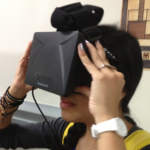Where are you from?
I was raised in Toronto, Canada.
What is your educational/professional background?
I did my undergrad in English Literature and Communication Studies at York University in Toronto. I did my Master’s at DM at Georgia Tech and wrote my thesis on how videogames might be more meaningful by comparing mechanics with various linguistic and rhetorical structures from modernist poetry. I’ve also worked a number of odd jobs from a private school teacher to a tech support chimp to a laboratory assistant.
What activities are you involved with on campus?

I’m currently working with students in Christopher Le Dantec’s project studio to further build on the Cycle Atlanta project. This is part of my work as a researcher with the Intel Science and Technology Center for Social Computing where I’m currently looking into how we can leverage digital platforms for greater civic engagement within issue-oriented communities. The Cycle Atlanta project is a smartphone app where cyclists can record their rides and send that route information to city planners, equipping them with information to better develop bike infrastructure in Atlanta. Since cyclists are one of that communities that I’m looking at for my research— and being a cyclist myself— I’m also a member of the Bicycle Infrastructure Improvement Committee, which organizes Tech’s annual Bike Week celebration and works to implement bike facilities around campus. While my actual research might not be in game design anymore, it’s still pretty near and dear to my heart, so I’m also peripherally involved with the Different Games group under the {egg} lab.
Describe your interests in the DM field.
My work focuses on the different ways people use digital media to be engaged as citizens. My focus is less on how this happens through electoral or formal political institutions—like e-voting, for example—and more so through grassroots organizations or community engagement, like skillshare meetups or citizen science projects. What are the platforms that people use to self-organize, and how does that translate to civic action?
What has been your favorite project you’ve worked on so far? Why?
Even though it’s unrelated to my research, I think my favourite project so far has been Ascent, which I had the privilege of working on with four of my colleagues. It was a project where I was completely outside all of my comfort zones, from inflating and securing Mariam-sized balloons to constructing a suspension rig to figuring out how to reliably get wifi inside a freight elevator. It was an incredibly frustrating pretty much the entire time we were trying to get the thing to work, but when it all came together at the end, it was pretty satisfying to see the look of wonder on everyone’s faces, including our own! It was great to have a part in creating this awe-inspiring, sensory experience that provoked people to ask about digital media who otherwise might not be interested.
Why did you choose DM at GT?
I think one of the strengths of our program is being able to make digital media accessible and relevant where people might not otherwise think they can be used. The program isn’t just about developing novel new devices or studying the ‘effects’ of technologies—not that there’s anything wrong with either of those, of course—but the Digital Media program is unique in considering which technologies work best for what specific purposes. By paying close attention to the affordances of digital media, we can better incorporate technologies into contexts where they make sense, whether that’s city planning, urban foraging, or videogame design.
What are your ambitions after finishing the DM program?
I’m still a few years away from having a real answer to this question, but there are a few options I’m considering. I’d love to continue on in academia and be a professor somewhere, but there might also be opportunities in the non-profit or community organizing worlds. Recently I’ve been thinking about ways to incorporate digital media and online organizing into field organizing, but that will need a lot more time than I’ve got to spare right now, so that might be an avenue I pursue when I graduate.
Why would you recommend the DM program to others?
Because we think about design, theory, and practice both inside and outside the academy, because we do everything from candy-vomiting duck heads to tabletop biology lessons to full-body puppet interfaces to videogame urban studies, and because we party as hard as we work.

